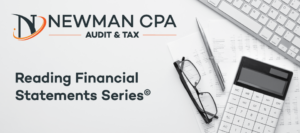In our previous blog, the second in our Reading Financial Statements Series we introduced you to cash. In the next few blogs we will explore some typical association balance sheet Read More >>
Blog
Reading Financial Statements Series Balance Sheet Part 2 – Cash
In our previous blog, the first in our Reading Financial Statements Series we introduced you to the balance sheet. In the next few blogs we will explore some typical association Read More >>
Reading Financial Statements Series – Part 1 – Balance Sheet
This blog will introduce you to balance sheets. It is the first in our Reading Financial Statements Series© What is a balance sheet? Balance sheets present the financial position of Read More >>





